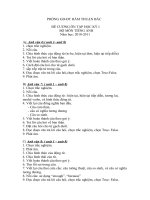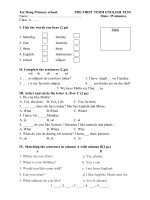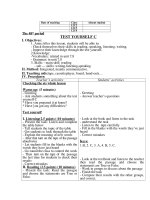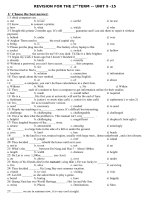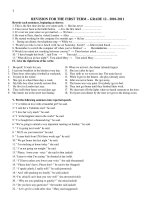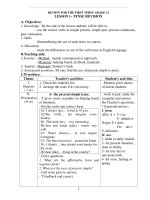revision for the first term - hệ 3 năm
Bạn đang xem bản rút gọn của tài liệu. Xem và tải ngay bản đầy đủ của tài liệu tại đây (220.56 KB, 15 trang )
Teaching plan 12 (3 year program) School year: 2010 - 2011
Teacher: Nguyễn Thị Thủy
Date of teaching: 09/12/ 2010
Date of teaching:
Period 50 REVISION FOR THE FIRST TERM
A. AIMS
I. OBJECTIVES:
1. Knowledge:
- Topic: all topics from lesson 1 to lesson 6
- Vocabulary: the vocabulary from lesson 1 to lesson 6
- Structure: Verb tenses, gerund, present participle and past participle
2. Skill: - By the end of the lesson, students will be able to revise and remember all the structures they
have learnt and give the correct tenses of the verbs
Skills: writing, reading, speaking
II. TEACHING AIDS:
1. Teacher’s preparation: charts ; textbooks
2. Students’ preparation: revise the old lesson
B. PROCEDURE :
Teacher’s activities Time Students’ activities
I. ORGANIZATION:
- Greets
- Checks students’ attendance
Who is absent today?
II. CHECKING THE OLD LESSON:
No checking
III. NEW LESSON:
* Warm-up: Game: “Noughts and crosses”
Complete the following sentence with the given
phrases of time and correct tense:
“Lan (do) exercises ….”
1. now 2. yesterday 3. since 2 o’clock
4. at the moment 5. everyday 6. at 8 last night
7. when I came 8. tomorrow 7. for one hour
- Devides the class into 2 groups
- Asks students to mane all the tenses in the above
sentences with above expressions of time
- Asks students repeat the form and uses of verb tenses
1. Revision of verb tenses
a. The simple present
* Form?
2ms
5ms
Greet
Answer
Play the game by completing the
sentence
Work in 2 groups
Eg: 1. Lan is doing exercises now
2. Lan did exercises yesterday.
* Form:
+ §èi víi ®éng tõ to be :“ ”
(+) s + is/ am/ are ......
(-) s + is/ am/ are + not ......
(?) is/ am/ are + s + ..... ? -
+ §èi víi ®éng tõ thêng (ordinary
verbs):
(+) S + V
(S/ES)
+ (O)
(-) S + DONOT/ DOESNOT + V (infinitive)
+(O)
Revision for the first term
1
Teaching plan 12 (3 year program) School year: 2010 - 2011
Teacher: Nguyn Th Thy
* Uses?
b. The present progressive
* Form?
* Uses?
c. The present perfect:
* Form?
*Uses?
d. The simple past:
* Form?
* Uses:
13ms
(?) DO/ DOES + S + V(infinitive) + (O) ?
- Din t mt hnh ng thng xuyờn
xy ra theo thúi quen hin ti: i vi
usually, often, sometimes every + time
- Din t s tht hin nhiờn, chõn lý
* Form:
S + is/ am/ are + V-ing
* Uses: din t hnh ng ang xy ra ti
thi im núi. Thng i vi cỏc trng
ng nh now, at the moment, at the
present hoc kt hp vi cõu mnh lnh
trc.
*Form: S + have/ has + V-ed/ Vct 3
*Uses:
- Din t hnh ng xy ra trong quỏ
kh, kộo di cho ti hin ti (dựng vi
since, for)
- Din t hnh ng va mi xy ra (just)
- Din t hnh ng ó xy ra nhng
khụng rừ thi gian
- Din t hnh ng xy ra nhiu ln
trong quỏ kh v cú th lp li hin ti
hoc tng lai
* Adv + Prep. : since + mc thi gian,
for + khang thi gian, lately, recently,
so far, ever, never, just, before
* Form:
* To be:
S (I, He, She, It, danh từ số it) + was ..
S (We, You, They, danh từ số nhiều ) +
were +
* Ordinary verbs (động từ thờng)
(+) S + V-ed (đối với những động từ có
qui tắc)/ Vcột 2 (động từ bất qui tắc)
(-) S + did + V nguyên thể +
(?) Did + S + Vnguyên thể + ?
- Yes, S + did/ No, S + didnt
Uses: Thì quá khứ đơn diễn tả:
+ hành động đã xảy ra và chấm dứt ở 1
thời điểm xác định ở quá khứ:
Eg: I taught English last year.
+ thói quen hoặc hành động thờng làm ở
quá khứ:
Eg : We often played football on
Sunday.
+ hành động kết tiếp nhau trong quá
khứ:
Revision for the first term
2
Teaching plan 12 (3 year program) School year: 2010 - 2011
Teacher: Nguyn Th Thy
e. The past continuous:
* Form?
* Uses?
2. Revision of Gerund:
- Asks students to repeat something about gerund
- Gives feedbacks
3. Present participle and Past Participle as
adjectives:
- Repeats present participle and past participle as
adjectives:
+ Present participle : (V-ing) c dựng miờu t s
vt v mang ngha ch ng
+ Past participle (V-ed) : dduwwocj dựng miờu t
cm xỳc ca ngi v mang ngha b ng
Eg: This is a tiring work. (Tiring là hiện tại
phân từ đứng trớc work là danh từ).
I am tired of this work. (Tired là quá khứ
phân từ )
+ Các động từ thờng gặp sau đây thêm đuôi ING/ED
trở thành tính từ nh: tire, bore, surprise, amuse,
frighten, interest, excite, please
Tired of, interested in, surprised at, amused at/ by,
axcited about, bored with, frightened of, terrified of,
pleased with,
4. Exercises:
a. Exercise 1: Give the correct form of the verb in
brackets:
1. Yesterday, he (come) home, (have) dinner and (go)
to bed.
2. At the present that author (write) a novel about
students life.
3. When I arrived at his house, he (read) a book.
5ms
5ms
14ms
Eg: I never smoked, drank or stayed
up late.
* Form:
S + was/ were + V-ing
* Uses:
- Din t mt hnh ng ang xy ra ti
im thi gian xỏc nh trong quỏ kh
- Din t mt hnh ng ang xy ra
trong quỏ kh thỡ cú mt hnh ng khỏc
xen vo (kt hp vi quỏ kh n)
- Gerund is functioned as a subject
- Gerund is after some verbs: like,
love, hate, dislike, enjoy, avoid, practice,
keep, mind, finish, start, begin, stop, give
up , cant stand, cant bear
- Gerund is after prepositions
* some adj + preposition:
Eg:
We read an interesting book.
We are interested in reading book.
The film is boring.
We are bored with the film.
Funny stories is amusing.
We are amused at funny stories.
Do exercise individually
Expected answers:
1. came/ had/ went
2. is writing
3. was reading
4. has tried/ has not succeeded
5. 5. circles
6. is/ finished/ has worked/ came
Revision for the first term
3
Teaching plan 12 (3 year program) School year: 2010 - 2011
Teacher: Nguyễn Thị Thủy
4. My brother (try) to learn French for years, but he
(not succeed) yet.
5. The earth (circle) the sun once every 365 days.
6. My brother (be) a teacher of history. He (finish)
university in 1980. He (work) as a teacher of history
for 22 years. Two years ago, he (come) to Hanoi for
his holiday.
7. My brother usually (read) a book after dinner. He
(like) books very much and he (buy) many novels
recently.
8. He (watch) a football match on TV at 9 last night.
b. Fill in the blank with suitable preposition:
1. He is fond ______ sitting alone in a boat and doing
nothing.
2. The boy is bored ________ listening _______ the
opera singing.
3. She has been out _______ work.
4. I can’t help you. I am bad _______ English.
5. He usually watches the news ______ TV at 6.
6. Are you afraid ______ swimming in the sea?
7. I am not interested _______ what you say.
8. Do you mind living ______ your own?
9. Mary is fed up _______doing the same thing
everyday.
10. I am tired ______ the work. I want a holiday.
IV. CONSOLIDATION:
Repeat the structures they have revised.
V. HOMEWORK:
- Asks students to revises all the structures
1’
7. reads/ likes/ has bought
8. was watching
Expected answers:
1. of
2. with/ to
3. of
4. at
5. on
6. of
7. in
8. on
9. with
10. of
listen to the teacher
Revision for the first term
4
Teaching plan 12 (3 year program) School year: 2010 - 2011
Teacher: Nguyễn Thị Thủy
Date of teaching: 09/12/ 2010
Date of teaching:
Period 51 REVISION FOR THE FIRST TERM (cont)
A. AIMS
I. OBJECTIVES:
1. Knowledge:
- Vocabulary: the vocabulary from lesson 1 to lesson 6
- Structure: comparison of adjectives and adverbs, relative pronouns and adverb
2. Skill: - By the end of the lesson, students will be able to revise and remember all the structures they
have learnt, give the correct form of the words, and combine the sentences using relative pronouns
Skills: writing, reading, speaking
II. TEACHING AIDS:
1. Teacher’s preparation: charts; textbooks
2. Students’ preparation: revise the old lessons
B. PROCEDURE :
Teacher’s activities Time Students’ activities
I. ORGANIZATION:
- Greets
- Checks students’ attendance
Who is absent today?
II. CHECKING THE OLD LESSON:
No checking
III. NEW LESSON:
1. Revision of comparison of adjectives and adverbs
- Asks students to repeat comparison of adjectives and
adverbs
* Short adj/ adv?
* Long adj/ adv?
- Asks students to give some irregular adjectives and
adverbs:
2. Revision of relative pronouns and adverbs:
- Asks students to repeat relative pronouns and
adverbs
2.1. Who:
Ex1: The man has met your boss.He come from Italy.
subject
→ The man who comes from Italy has met your boss
relative clause
Ex2: We have met the girl. She studies in the shool.
→ We have met the girl who studies in the
2ms
5ms
15ms
Greet
Answer
Repeat the form
* Short adj/ adv: adj/ adv + er
* Long adj/ adv: more + adj/ adv
Good/ well – better
Bad/ badly – worse
Much/ many – more
Little – less
Far – farther/ further
Old – older/ elder
2.1. Who (người mà): Thay thế cho danh
từ chỉ người đứng trước và làm chủ ngữ
hay tân ngữ cho mệnh đề quan hệ
Eg: The boy who sits next to me is very
intelligent.
I don’t like the men who don’t speak the
truth.
Revision for the first term
5
Teaching plan 12 (3 year program) School year: 2010 - 2011
Teacher: Nguyễn Thị Thủy
school.
relative clause
Ex 3: We like the man. You talked to him yesterday.
object
→ We like the man who you talked to yesterday
* Lưu ý “Who” trong cấu trúc:
.... Noun/ pronoun (person) + who + verb .....
.... Noun / pronoun (person) + who + subject +
verb...... (Chúng ta có thể bỏ đại từ quan hệ trong
trường hợp này.)
2.2. Which (vật mà):
Ex1: She show me the table. It was made by her father.
She shows me the table which was made by her father.
Ex2: Do you like this car ? Mr. Tan bought it last month.
Do you like this car, which Mr.Tan bought last month ?
* Lưu ý các cấu trúc.
- ...... noun / pronoun (chỉ vật) + which +
verb ........
- ......noun/ pronoun (chỉ vật) + which + subject
+ verb .....
Note: “Which” có thể được sử dụng để thay thế cho
một mệnh đề đứng trước nó (= and this/ and that)
Ex: Tom is so lazy, and this makes Mrs. Green
worried.
Tom is so lazy, which makes Mrs. Green worried.
2.3. That ( vật mà, người mà): dùng thay thế cho cả
who, whom, which.
Eg: The flowers that I cut this morning are still
fresh.
• Trong các trường hợp sau đây “That” thường
được dùng nhiều hơn:
- Khi đi sau các hình thức so sánh hơn nhất:
Eg: He is the best man that I have ever seen.
- Khi đi sau: all, same, only, the first, the last và
đôi khi sau it is that và it was that
Eg: You are the only person that can help me.
Any boys that want to succeed must work
hard.
It is his wife that makes the decision in his
family.
- Khi đi sau các đại từ bất định: noone, nobody,
nothing, somebody, someone, anybody…
Eg: She always had everything that she wanted.
He never says anything that is worth listening
to.
- Khi danh từ đứng trước bao gồm cả người lẫn
vật:
2.2. Which (vật mà): dùng thay thế cho
danh từ chỉ vật, làm chủ ngữ hoặc tân
ngữ
Listen and take notes
2.3. That ( vật mà, người mà): dùng
thay thế cho cả who, whom, which.
Listen and take notes
Listen and take notes
Revision for the first term
6


